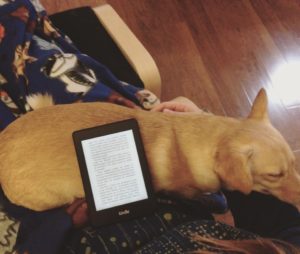Guest Post by Connie Schultz
This past year was a rough one for me; full of changes and growth and not nearly as much writing as I would’ve liked, I can sit here and tell you until I’m blue in the face that I did the best I could with what I had. But now I can show you. I can stick my money where my mouth is, and show you how worth it all of the challenges of 2016 were to me.
Behold the New Year’s mindset.
It’s got a sort of magic all its own, doesn’t it?
As I sit here writing this, the second day of 2017, bookstore attendants running around me (I can’t write at home—one of many things I discovered about myself last year), I can’t help but be excited by the idea of a new slate. And I certainly hope that this isn’t just me. Because this is more than just a time for me to prove that I can measure up to my goals and expectations for this year.
It’s your time to prove this to yourself as well.
As we step further into January, here are some ways to go about taking this new chance, and owning this fresh clean canvas we’ve all been given.
- Be Kind to Yourself
I’m still learning this one myself, to be honest with you. It’s hard, and more often than not I feel slightly dumb when I think about this, and then think about all the people pushing themselves to new heights, but this is a pivotal point to wrap your head around. It’s not easy doing new things, and growth takes time. How much harder will it be if you’re criticizing yourself every time you make a mistake?
- Set Aside Time Periodically to Make It a Habit
This is something you’ve probably heard several times, especially in regards to writing. J.K. Rowling once said to “be ruthless about protecting writing days,” and even if it’s just thirty minutes a day, or an hour on Sundays, I agree heavily that that is essential. Even if you have non-writing goals, be ruthless about protecting them. Write down what you want to complete over and over again as many times as it takes until you think about it so much that you’re dreaming about it at night. And then go do it.
- Never Give Up
Sometimes this is easier said than done. To keep going with a project idea when you just aren’t getting anything is hard. I’ve been there several times. It’s hard to not look down on yourself because you feel like you aren’t getting anywhere. But sometimes the only way to get around something, is to walk straight through it. Don’t let yourself give up just because you run into what feels like a brick wall. Grab your climbing gear and start pulling yourself up, because sometimes that’s the only way to continue moving forward.
- Don’t Forget to Have Fun
Writing is meant to be an enjoyable act. It’s taking the weird in your brain and making it tangible for all the world to see. It’s giving the inner child in you as much candy as you dare, and letting them run. As much as it can feel like work at times, and as much as part of it is work, don’t forget why you love this. Because at the end of the day, that’s why all of us stick around. Enjoy yourself. Love what you’re doing.
As much as some this probably feels like a rehash of the same old advice you’ve read a thousand times before, I think it’s important to hear all of this again. Because we’re human, and humans tend to have difficulty remembering things from time to time. Especially the things that can sometimes be vital to our sanity. So I hope that as you continue this month, typing or biking or sweating or whatever-else-you-plan-on-doing away, you come back to this. And maybe you smile, or maybe you sniff and click out of the window. But you’re here for a reason, and I admire you for remembering that.
Happy writing. And Happy New Year.
An interesting thing I’ve noticed as of late, is that there’s a distinct difference between waking up one morning to the realization that you’re just one day closer to the end of the month, and waking up to realize you’ve lasted another full rotation around the sun. Part of it, I think, is the hype we silly humans place on it—New Year’s and New Year’s Eve parties are the next big focus after Christmas, and boy do they come fast. The part that gets to me the most, though, is that this is another chance to make things how I want them to be. And even more personally, to become the writer and author I so strongly want to be.
 My name is Connie Schultz, I’m 18, and currently attending community college to attain my bachelor’s in journalism. I love fantasy and science fiction, but if the blurb on the back catches my attention, I will read just about anything. Eventually I would like to write novels full-time, but if I happen to write articles for science magazines/anything else involving science, I wouldn’t mind that either.
My name is Connie Schultz, I’m 18, and currently attending community college to attain my bachelor’s in journalism. I love fantasy and science fiction, but if the blurb on the back catches my attention, I will read just about anything. Eventually I would like to write novels full-time, but if I happen to write articles for science magazines/anything else involving science, I wouldn’t mind that either.
Some of my favorite things: J.K. Rowling, Brandon Sanderson, Star Trek, Veritasium, Philip K. Dick, Neil Gaiman, Stranger Things, and also dogs, chocolate, and orange juice.


